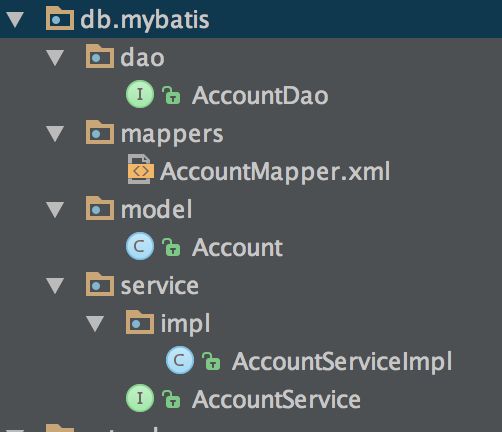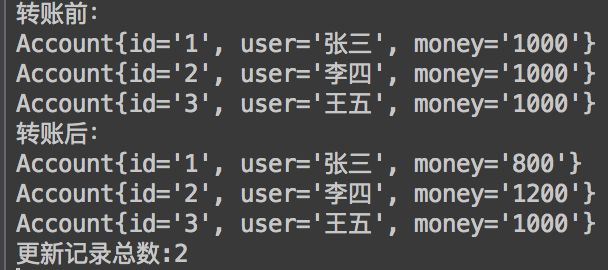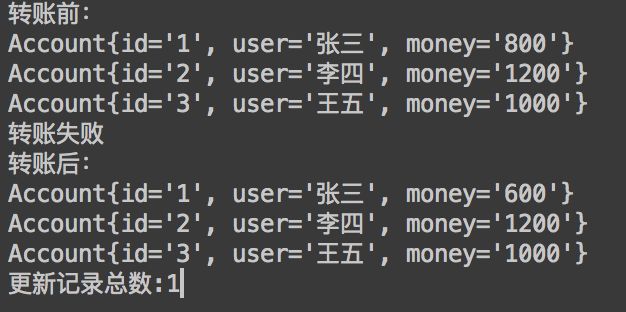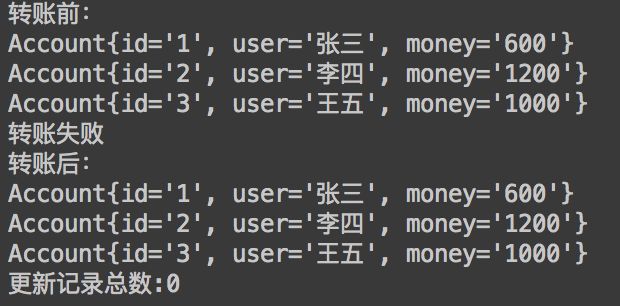AOP应用——事务管理
相信大家对Spring的事务管理并不陌生,再推荐一篇AOP切入点表达式的文章,我把重点放在AOP实现上。在项目开发过程中通常用Hibernate或MyBatis(iBatis)作为持久层,因此Demo基于Spring+MyBatis实现转账业务。时间很宝贵,先上代码。
spring-mybatis.xml
<beans
xmlns="http://www.springframework.org/schema/beans"
xmlns:xsi="http://www.w3.org/2001/XMLSchema-instance"
xmlns:context="http://www.springframework.org/schema/context"
xmlns:tx="http://www.springframework.org/schema/tx" xmlns:aop="http://www.springframework.org/schema/aop"
xsi:schemaLocation="http://www.springframework.org/schema/beans
http://www.springframework.org/schema/beans/spring-beans.xsd http://www.springframework.org/schema/context http://www.springframework.org/schema/context/spring-context.xsd http://www.springframework.org/schema/tx http://www.springframework.org/schema/tx/spring-tx.xsd http://www.springframework.org/schema/aop http://www.springframework.org/schema/aop/spring-aop.xsd">
<context:component-scan base-package="db.mybatis" name-generator="extend.CustomBeanNameGenerator">
<context:include-filter type="aspectj" expression="db.mybatis.service..*"/>
context:component-scan>
<context:property-placeholder location="jdbc.properties"/>
<bean id="dataSource" class="com.mchange.v2.c3p0.ComboPooledDataSource">
<property name="user" value="${jdbc.username}"/>
<property name="password" value="${jdbc.password}"/>
<property name="jdbcUrl" value="${jdbc.url}"/>
bean>
<bean class="org.mybatis.spring.SqlSessionFactoryBean" id="sqlSessionFactory">
<property name="dataSource" ref="dataSource"/>
<property name="mapperLocations" value="classpath:db/mybatis/mappers/**/*.xml"/>
bean>
<bean id="sqlSessionTemplate" class="org.mybatis.spring.SqlSessionTemplate">
<constructor-arg ref="sqlSessionFactory"/>
bean>
<bean class="org.mybatis.spring.mapper.MapperScannerConfigurer">
<property name="basePackage" value="db.mybatis.dao"/>
<property name="sqlSessionTemplateBeanName" value="sqlSessionTemplate"/>
bean>
<bean id="dbTransactionManager" class="org.springframework.jdbc.datasource.DataSourceTransactionManager">
<constructor-arg name="dataSource" ref="dataSource"/>
bean>
<aop:config proxy-target-class="true">
<aop:advisor advice-ref="transactionInterceptor" pointcut="execution(* db.mybatis.service..*Impl.*(..))"/>
aop:config>
<tx:advice id="transactionInterceptor" transaction-manager="dbTransactionManager">
<tx:attributes>
<tx:method name="add*" propagation="REQUIRED"/>
<tx:method name="insert*" propagation="REQUIRED"/>
<tx:method name="save*" propagation="REQUIRED"/>
<tx:method name="update*" propagation="REQUIRED"/>
<tx:method name="modify*" propagation="REQUIRED"/>
<tx:method name="edit*" propagation="REQUIRED"/>
<tx:method name="delete*" propagation="REQUIRED"/>
<tx:method name="remove*" propagation="REQUIRED"/>
<tx:method name="get*" read-only="true" propagation="SUPPORTS"/>
<tx:method name="find*" read-only="true" propagation="SUPPORTS"/>
<tx:method name="load*" read-only="true" propagation="SUPPORTS"/>
<tx:method name="search*" read-only="true" propagation="SUPPORTS"/>
<tx:method name="*" propagation="SUPPORTS"/>
tx:attributes>
tx:advice>
beans>项目目录结构如下

这一部分要完成的任务就是上面那些了,我们开始动手吧。
1、开发所需jar包
建议用maven或Gradle(eclipse暂不支持)管理。如果用maven管理,只要添加以下依赖。
<dependency>
<groupId>org.apache.commonsgroupId>
<artifactId>commons-lang3artifactId>
<version>3.4version>
dependency>
<dependency>
<groupId>log4jgroupId>
<artifactId>log4jartifactId>
<version>1.2.17version>
dependency>
<dependency>
<groupId>junitgroupId>
<artifactId>junitartifactId>
<version>4.12version>
<scope>testscope>
dependency>
<dependency>
<groupId>mysqlgroupId>
<artifactId>mysql-connector-javaartifactId>
<version>5.1.6version>
dependency>
<dependency>
<groupId>org.springframeworkgroupId>
<artifactId>spring-contextartifactId>
<version>4.2.1.RELEASEversion>
dependency>
<dependency>
<groupId>org.springframeworkgroupId>
<artifactId>spring-coreartifactId>
<version>4.2.1.RELEASEversion>
dependency>
<dependency>
<groupId>org.springframeworkgroupId>
<artifactId>spring-beansartifactId>
<version>4.2.1.RELEASEversion>
dependency>
<dependency>
<groupId>org.springframeworkgroupId>
<artifactId>spring-expressionartifactId>
<version>4.2.1.RELEASEversion>
dependency>
<dependency>
<groupId>org.springframeworkgroupId>
<artifactId>spring-jdbcartifactId>
<version>4.2.1.RELEASEversion>
dependency>
<dependency>
<groupId>org.springframeworkgroupId>
<artifactId>spring-txartifactId>
<version>4.2.0.RELEASEversion>
dependency>
<dependency>
<groupId>org.springframeworkgroupId>
<artifactId>spring-testartifactId>
<version>4.2.1.RELEASEversion>
dependency>
<dependency>
<groupId>org.springframeworkgroupId>
<artifactId>spring-aopartifactId>
<version>4.2.1.RELEASEversion>
dependency>
<dependency>
<groupId>org.springframeworkgroupId>
<artifactId>spring-aspectsartifactId>
<version>4.2.1.RELEASEversion>
dependency>
<dependency>
<groupId>c3p0groupId>
<artifactId>c3p0artifactId>
<version>0.9.1.2version>
dependency>2、配置spring-mybatis.xml
配置完之后和最开始放上去是一样的,这里主要对一些配置做说明:
(1)
默认情况下IOC容器是根据类名来命名的,不同模块相似的功能很多类名是一样的,这时候beanid不唯一,项目不能正常启动。
配置的类代码如下:
public class CustomBeanNameGenerator implements BeanNameGenerator {
@Override
public String generateBeanName(BeanDefinition definition, BeanDefinitionRegistry registry) {
return definition.getBeanClassName().replaceAll("\\.", "").replace("Impl","");
}
}(2)
其type类型有五种,建议使用aspejct和regex。这样你不需要在每个类加类似@Service这样的注解;在不同的上下文中扫描目录明确。
(3)
推荐一篇文章,请点击
3、开始开发
dao层的xml和接口
<mapper namespace="db.mybatis.dao.AccountDao">
<resultMap id="BaseResultMap" type="db.mybatis.model.Account">
<id column="id" property="id"/>
<result column="user" property="user"/>
<result column="money" property="money"/>
resultMap>
<select id="getRecords" resultMap="BaseResultMap">
SELECT id,user,money FROM account
select>
<select id="getMoneyByUser" resultType="double">
SELECT money FROM account where user = #{user}
select>
<update id="updateMoneyByUser">
update account set money=${money} where user = #{user}
update>
mapper>public interface AccountDao {
List getRecords();
double getMoneyByUser(String user);
int updateMoneyByUser(@Param("money")double money,@Param("user")String user);
} service的接口和实现类
public interface AccountService {
/**
* 查询所有的人员记录
* @return
*/
List getRecords();
/**
* 转账
* @param user1 转钱的人
* @param user2 收钱的人
* @param money 转出去的钱
* @return
*/
int transAccount(String user1,String user2,double money);
} public class AccountServiceImpl implements AccountService {
@Resource
private AccountDao accountDao;
@Override
public List getRecords() {
return accountDao.getRecords();
}
@Override
public int transAccount(String user1, String user2, double money) {
int result = 0;
double money1 = accountDao.getMoneyByUser(user1);
if (money1 > money) {
result += accountDao.updateMoneyByUser(money1 - money, user1);
double money2 = accountDao.getMoneyByUser(user2);
result += accountDao.updateMoneyByUser(money2 + money, user2);
} else {
System.out.println(user1 + "的余额不足");
}
return result;
}
} 测试类
public class UnitTestBase {
private ClassPathXmlApplicationContext context;
private String springXmlPath;
public UnitTestBase(String springXmlPath) {
this.springXmlPath = springXmlPath;
}
@Before
public void before() {
if (StringUtils.isEmpty(springXmlPath)) {
springXmlPath = "classpath:applicationContext.xml";
}
try {
context = new ClassPathXmlApplicationContext(springXmlPath.split("[,\\s]+]"));
context.start();
} catch (BeansException e) {
e.printStackTrace();
}
}
@After
public void after() {
if (context != null)
context.destroy();
}
protected T getBean(String beanId) {
try {
return (T) context.getBean(beanId);
} catch (BeansException e) {
e.printStackTrace();
return null;
}
}
protected T getBean(Class clazz) {
try {
return context.getBean(clazz);
} catch (BeansException e) {
e.printStackTrace();
return null;
}
}
} public class TestDB extends UnitTestBase {
public TestDB() {
super("classpath*:spring-mybatis.xml");
}
@Test
public void testDB() throws Exception {
AccountService accountService = getBean("dbmybatisserviceimplAccountService");
System.out.println("转账前:");
List records = accountService.getRecords();
printCollection(records);
int transCount = accountService.transAccount("张三", "李四", 200);
System.out.println("转账后:");
records = accountService.getRecords();
printCollection(records);
System.out.println("更新记录总数:" + transCount);
}
private void printCollection(Collection collection) {
Iterator iterator = collection.iterator();
while (iterator.hasNext()) {
System.out.println(iterator.next().toString());
}
}
} 第一次执行结果如下:

现在将AccountServiceImpl中transAccount方法改为
@Override
public int transAccount(String user1, String user2, double money) {
int result = 0;
double money1 = accountDao.getMoneyByUser(user1);
if (money1 > money) {
result += accountDao.updateMoneyByUser(money1 - money, user1);
result += 1 / 0;
double money2 = accountDao.getMoneyByUser(user2);
result += accountDao.updateMoneyByUser(money2 + money, user2);
} else {
System.out.println(user1 + "的余额不足");
}
return result;
}再把测试方法改为
AccountService accountService = getBean(AccountService.class);
System.out.println("转账前:");
List records = accountService.getRecords();
printCollection(records);
int transCount = 0;
try {
transCount = accountService.transAccount("张三", "李四", 200);
} catch (Exception e) {
System.out.println("转账失败:"+e.getClass().getName()+" "+e.getCause());
}
System.out.println("转账后:");
records = accountService.getRecords();
printCollection(records);
System.out.println("更新记录总数:" + transCount); 再测试下我们的程序,结果如下:

这时候张三转出去了200,但李四没收到200
我们在spring-mybatis.xml配置文件中
再测试下我们的程序,结果如下:

AOP通过配置XML在事务管理的应用到此结束。
4、事务管理注解实现
在spring-mybatis.xml文件中添加标签
说明:
注解跟AOP配置文件实现可共存,也可只使用一个;
建议只使用一个,而且使用注解,因为在开发过程中aspectj配置很容易无效,而注解的代理模式(默认模式)不会出现这个问题。关于这个问题请阅读,我测试只用一个文件还是遇到了这样的问题。